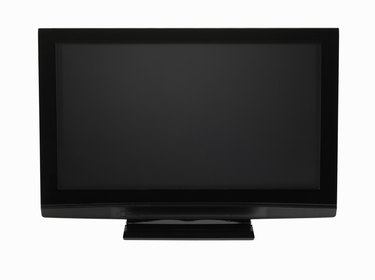
Electronics manufacturer LG makes a variety of products, including flat-screen TV sets. When you are shopping for a TV, you may see a lot of unfamiliar abbreviations. Among them are DTV and CATV. It is important to know what these mean if you wish to know exactly what you are buying and whether it will meet your needs.
CATV
Video of the Day
The abbreviation CATV is short for "community antenna television" or "community access television," but it is more commonly referred to as cable TV. The name stems from its origins as a way of providing a television signal to communities in which it was difficult to receive radio broadcasts. A communal antenna would be set up and the signal would distributed with coaxial cables. In more modern times, CATV refers to an analog television signal carried through a coaxial cable (the round kind with a single wire in the middle).
Video of the Day
DTV
The abbreviation DTV is short for "digital television." It refers to a television signal that has been encoded as bits of digital information, as opposed to the analog signals that were used before digital television came along. This encoding allows broadcasters to provide a higher quality picture and sound, or to provide multiple signals using the same bandwidth that used to be used for only one.
Digital Transition
All of the full-power television stations inside the United States changed from analog (CATV) signals over to DTV as of June 12, 2009. Many independent cable companies have made the same transition. Anyone who had an older television set that wasn't equipped to receive the new DTV format had to get a converter box. This box changes the DTV signal from the digital antenna or cable into an analog signal that the television can display.
TV Specifications
If you get a TV today, its specification may boast that it can use both CATV and DTV. What this means is that you can plug in either a CATV signal from the old-fashioned variety of television, or a DTV signal from your antenna or a cable service that has made the DTV transition. The TV will be able to interpret either one and display it without a problem.